How To Choose The Right Paver
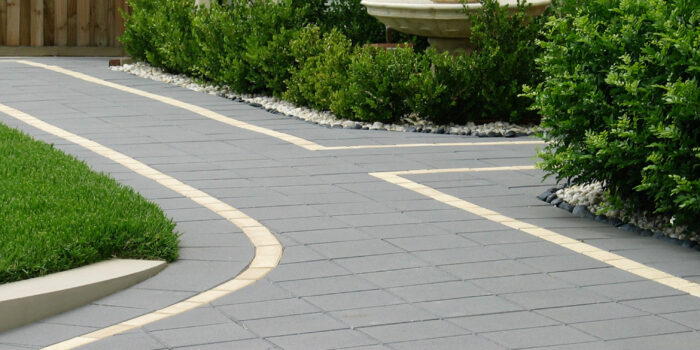
In today’s modern lifestyle, many of us treat our outdoor areas as an extension of the indoor living space. When planning a renovation project to our outdoor rooms, we need to consider more than what colour the roof or gutters are to match, although that is often a good starting point.
Just like your carpet, kitchen backsplash or interior paint colour scheme, you need to consider your outdoor paver and tile choice carefully. Below are a few considerations for when deliberating on such decisions:
- The period of the house (eg. old QLD’er or modern rendered home)
- Your current decorating style (eg. country cottage or ultra-modern)
- Gutter, fascia and roof colour (eg. colorbond roof colours)
- House material and colour (eg. clay brick, rendered or weatherboard)
- Size of the space, terrain and soil type (eg. clay soil or highly reactive soil)
- Amount of natural light available (eg. covered area or exposed to natural bright daylight)
- Other horizontal surfaces that the area will meet (eg. turf, garden beds, retaining wall products, other paved areas or your internal flooring choice)
- Internal colour scheme of flooring (eg. white porcelain tiles)
- Planned use for the space (eg. BBQ area)
- Weather conditions (locality of the home)
- Current colour trends (check out designer magazines and television shows)
- Future expansion plans (will you be adding on to this later, or changing its use in a future extension)



Have you chosen a style or theme for your home?
Choosing the type and style of your paver can be made easier if you have decided on a type of ‘theme’ or aesthetic for your home. For example –
- A modern, sleek style of home may want a large format paver
- Coastal or Hamptons will suit more lighter colour pavers
- Industrial style would suit greys and charcoal pavers
- Traditional homes may benefit from the clay range of pavers
Period of the house
This is important, as you may want to keep a consistent look for your home. Cottage style homes traditionally suit our Bluestone range of pavers and tiles or even our Marble or Travertine pavers. If your home has traditional red brick, then our clay brick pavers in a herringbone pattern may match the period of the house.
I have kids and/or pets
Your lifestyle is just as important as your aesthetics. Having kids and pets may mean that a scratch resistant paver is required and something that is very durable and hardwearing. Each paver should list its features and benefits, so be sure to read over these so you understand your paver’s resilience.
They need to suit my lifestyle as I love to entertain
Your outdoor space is an extension of your home and a big part of entertaining your guests. Barbeques, food and drinks all lead to potential spills, so a stain resistant paver might be important to you. If your guests tend to wear heels or shoes that could scratch your pavers, then consider a scratch resistant paver. Whatever your lifestyle, there is a paver choice to suit your needs. Our large format Stoneware pavers are designed to help keep your space clean.
Need added strength and durability
Sometimes, strength and durability are critical to a paving project, especially driveways, pathways with vehicle access and high traffic areas. A 50mm or 60mm thickness paver is recommended to withstand these additional pressures, such as weight bearing loads and the twisting and turning of tyres. You can also add to the durability of your pavers with your paving pattern, as an interlocking paving pattern helps to strengthen them further.
You can read more about Paving Patterns here –
Aesthetics are important to me
If the aesthetics of your paver is a priority, then a premium range of paver will suit your needs. A premium paver not only looks impressive and stylish, but they are also a high quality, durable paver that generally has many features and benefits.
I need to match / complement my existing colours
These days, paving colours is very extensive! No matter what your project, there will be a paver that will match your existing colours. If you are starting with a blank canvas, you may want to select a paver that matches with our products, such as garden walls, retaining walls and steps.
You can also go a step further and get an outdoor paver that has a matching 12mm indoor tile so you can use the one product both inside and outside your home for a completely matching and seamless look.
View our range of Tiles here –



Budget
Having a clear budget for your paving project will also help you determine which pavers to choose. If you are getting your paver installed by a tradie, your paver choice can also affect your installation costs due to the number of cuts, the weight of the pavers and ease of use. Paving quotes are generally quoted per square metre (m2), which makes it easier to work out your costs for your pavers.
But how do you accurately calculate how many pavers you will need?
The easiest way to do this is by measuring the space you plan to pave. Multiply the length and width of your area to get the total square metre (m2). Once you have figured the entire area and how many pavers you’ll need, we recommend adding an extra 5% to the number. These additional pavers will account for cuts and breakages that may happen.
You can read more about calculating areas here.
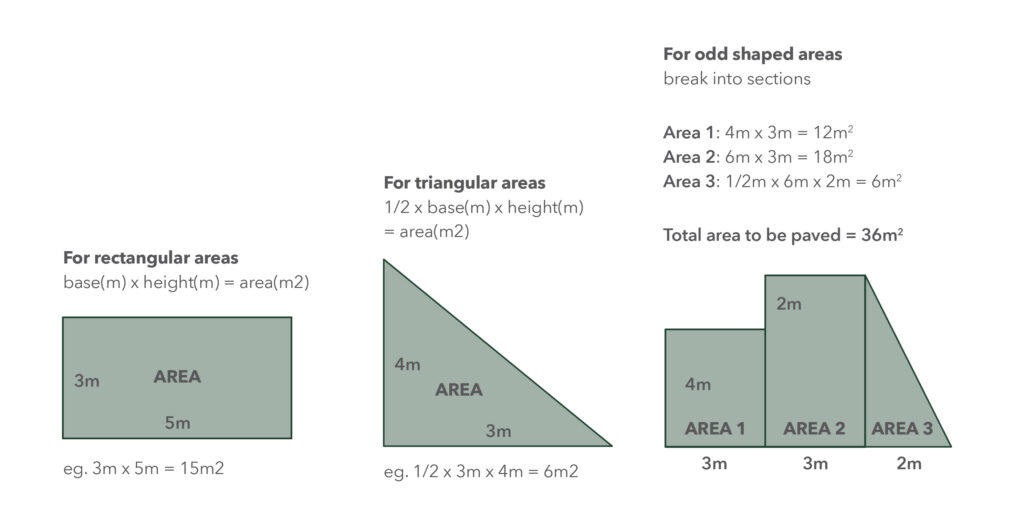
Do I need a specific type of paver for around my pool?
Not all pavers are created equal. Some are salt and slip resistant as well as cool under foot. These are important features for paving around your pool. Some pavers don’t absorb as much heat, meaning they are cool under your feet. Matching coping, step treads and bullnose or drop face / rebated edge are also factors you’ll want to consider when choosing your paver to ensure you have a completely cohesive and seamless look.
View our range of Pool Pavers here –
See more on Pool Coping and Step Treads here –
About colour choices
The current trends in paver colours, much like paint, tiles, carpet and so on, is for warm neutrals such as whites, creams, light and dark greys.
A few points worth noting when it comes to your paver colour are both light and heat. Stark whites in direct sunlight can be quite glarey through the peak of the day, while dark colours like charcoals and black can create and hold heat increasing the surface temperature on a hot summers day.
Keep in mind that the instore paving display will always appear lighter once home and laid in a large area.
Next, recognise that colour can affect the apparent size of a space. Lighter pavers can make a room look larger and darker colours can make a space look smaller and more intimate. If you can’t decide what colour works best, go neutral! It’s much easier to match any future enhancements in a space with neutral colours.
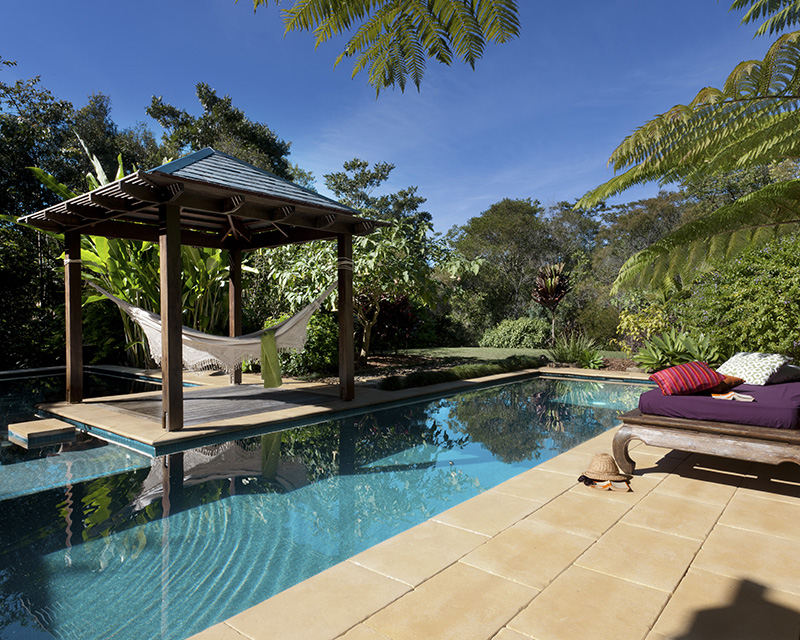


I want to pave my shed
If you’re paving in a shed, you want something durable, and you’ll want it to be cost-effective. A budget range paver or even seconds pavers are perfect for areas such as sheds, chicken coops, or spaces not in visible areas.
You can view our range of Budget Pavers here or visit us instore to see what Seconds stock we have available.
What can I use for stepping stones?
Most large pavers can be used for step stones, or you can choose a paver specifically designed for stepping stones.
You can read more about DIY Stepping Stones in our brochure here –
Or view our range of Stepping Stones here –
I would love a product that I can use inside my home as well as outside
Many people these days want the one product they can use inside and outside to get a completely matching style for their home. If you’re going to match indoor and outdoor products, ensure that the paver you choose is also available in a 12mm indoor tile. 12mm tiles are laid on concrete, and pavers are laid on sand or mortar.
Our Stoneware range and some of our Travertine range are perfect for exactly this purpose.
View our range for tiling over exisiting concrete here –
Do a need a certain thickness paver?
For general paving around your home, a 30mm or 40mm paver is required. However, a 50mm paver is needed for driveways, vehicle access areas, or very high foot traffic spaces.
You can view our range of Driveway pavers here –
For more information on the best driveway pavers, read our blog here.
Small or Large Format
Your internal tiles or size of the space may dictate your paver size choice. As a general rule of thumb, small pavers with more joins can make an area feel smaller and larger pavers with fewer joins can simplify the space and create a more open feel.
The current trend in pavers is large format squares and rectangles from 400x400mm right up to 1200x600mm. These larger pavers mean less product to shift and lay but make sure you consider the weight of each paver – as these pavers weigh up to 34kg each, and if you or your tradesman need to move these pavers by hand, that can add to your bill (or fitness!).
More traditional designs tend to incorporate a more conventional paver, such as smaller clay pavers sized 230x115mm. You can view our range of Clay Pavers here.
These smaller pavers allow for more scope in laying patterns that you don’t get with a larger paver. Other times a smaller paver may come in handy such as against garden beds. Smaller pavers are easier to manipulate around curves which will allow you to minimise your cuts and wastage.
View our range of Large Format pavers here –
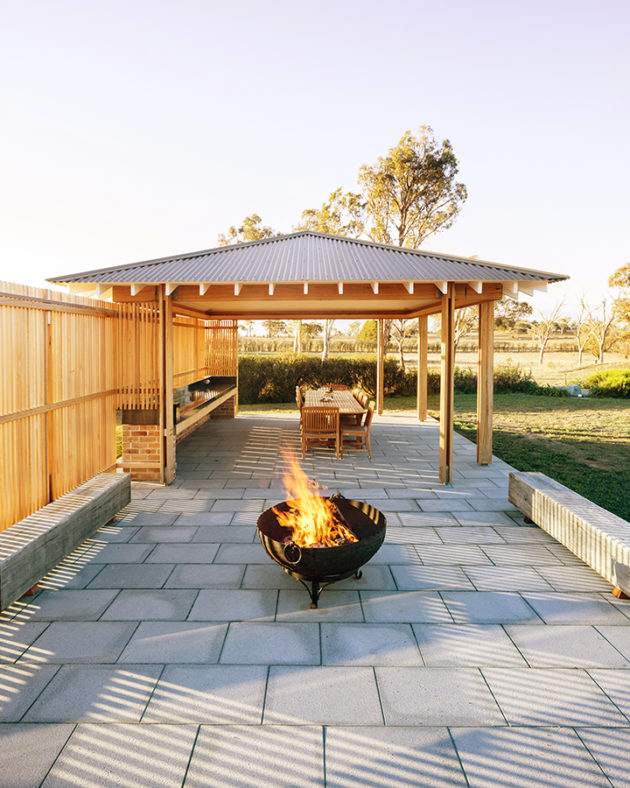

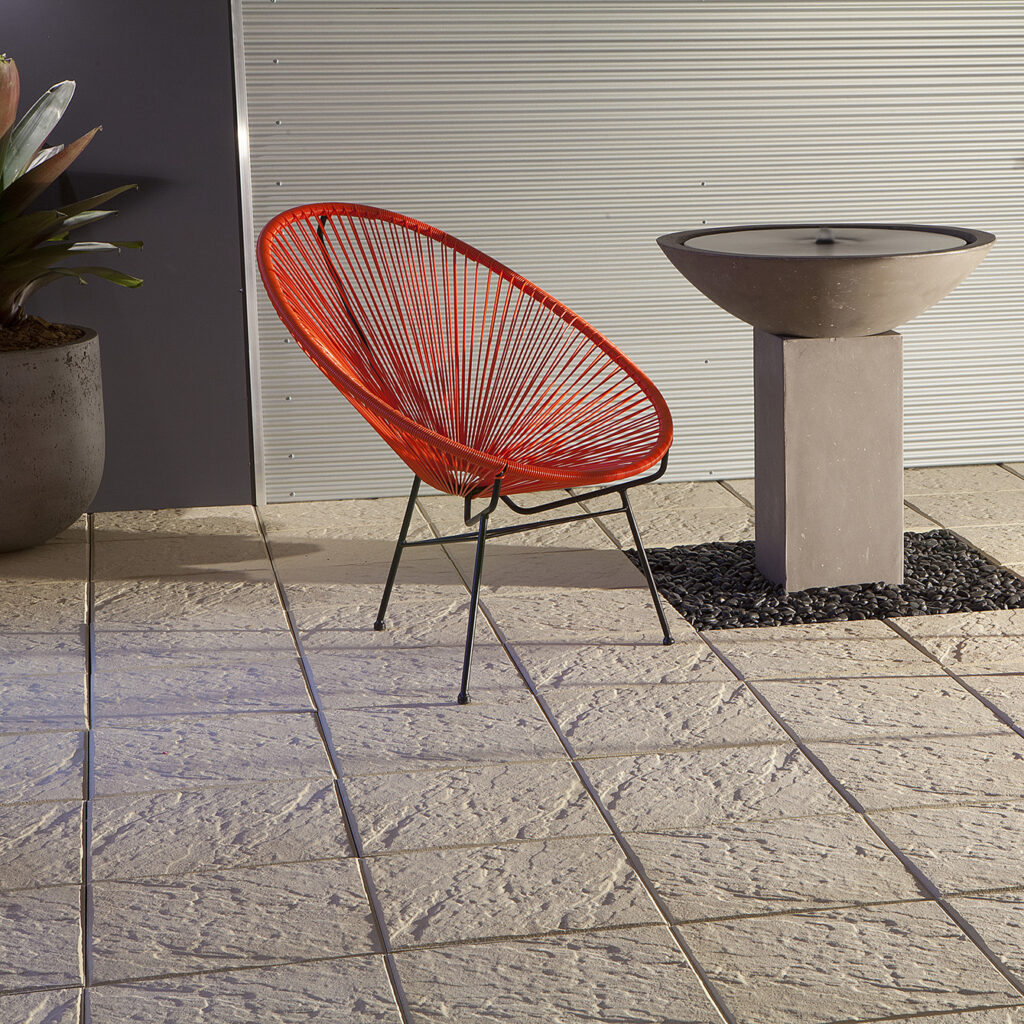
Will my pavers stain from my BBQ?
Some pavers can stain, and some are stain resistant. You should make sure you read the benefits of your pavers to ensure you are selecting a stain resistant and durable paver for around BBQ. Otherwise, you should ensure that you use a paving sealer to help reducing staining and make cleaning easier.
Our Stoneware pavers are all stain resistant. You can view the range here –
Will my pavers fade?
Some pavers may naturally, over some time, lighten slightly if in direct sun. There are also pavers that will not change their appearance or fade at all. You can also apply a paving sealer to reduce your pavers from fading.
How readily available are they?
Most pavers are made here in Australia or Adelaide. Some natural stones, Travertine and Marble, are imported from overseas, like Turkey.
For smaller businesses that cannot hold a lot of inventory, there may be a long wait time for stock to arrive as they order stock as required. However, at Australian Paving Centre, we always try to ensure we have plenty of stock available across all stores so that you can complete your paving projects quickly.
Are they likely to be discontinued in the future if I need more?
If you are looking for a paver that you know you’ll require more of in future, make sure to ask if a product is part of their ongoing range.
Will red wine stain my pavers?
If you love your red wine and love to entertain, then worrying about staining your pavers can be a concern unless you choose from APC’s range of stain resistant pavers.
Depending on what paver you chose, then yes, your pavers can be stained by red wine. You can use a paving sealer to help minimise staining and protect your pavers, plus it makes cleaning your pavers easier.
If you already have some stained pavers, the great thing about paving is that you can easily replace the stained pavers.
You can also view our ‘Paver Maintenance and Remedies’ brochure for any trouble shooting with soiled pavers here –

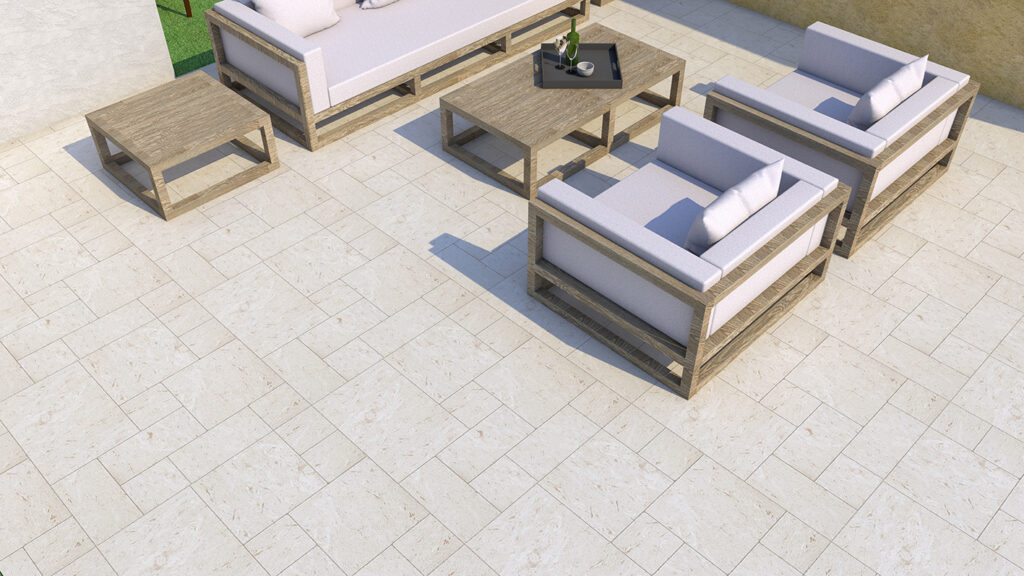

How hot do they get?
Most pavers will withhold a certain level of heat when exposed to the sun. If you are looking for a paving product that won’t burn your feet, you should look for the feature ‘cool under foot’ from your paver choice. This means that they don’t retain heat and are cooler to walk on. These pavers are popular around pool areas as people will generally be on bare feet, so cool under foot pavers is essential.
Our Limestone and Travertine pavers are perfect for cool under foot paving.
Will they crack?
If your base preparation and pavers have been laid correctly, plus you have selected the correct thickness paver for your requirements (e.g. 50mm for driveways/vehicles), your pavers should not crack, unlike poured concrete.
Read more about why choose pavers instead of poured concrete here.
You can read our 10 reasons to choose pavers instead of concrete for your driveway here.
How hard are pavers to lay?
There are many DIY resources available these days, and laying pavers can be reasonably straight forward. If you plan to do your paving project yourself, you can make the job easier by minimising the number of cuts you have to make.
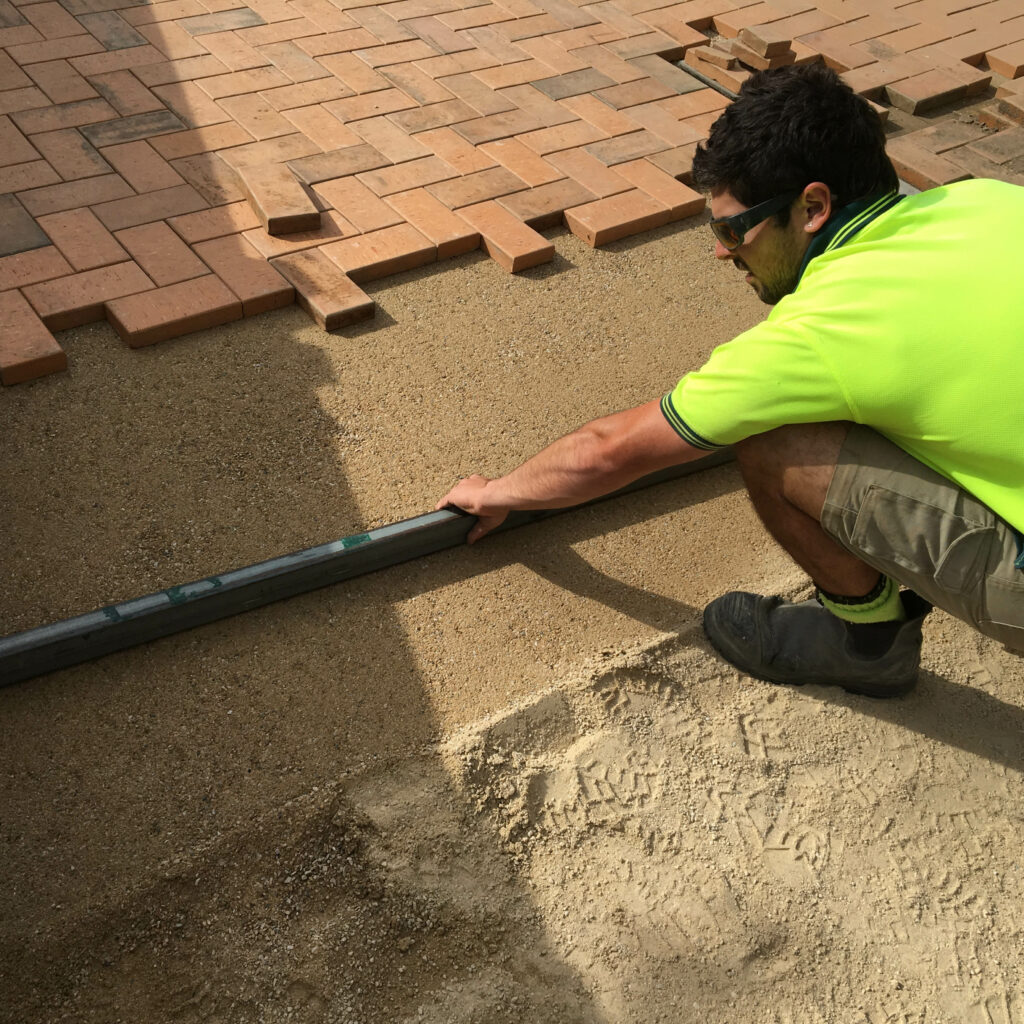
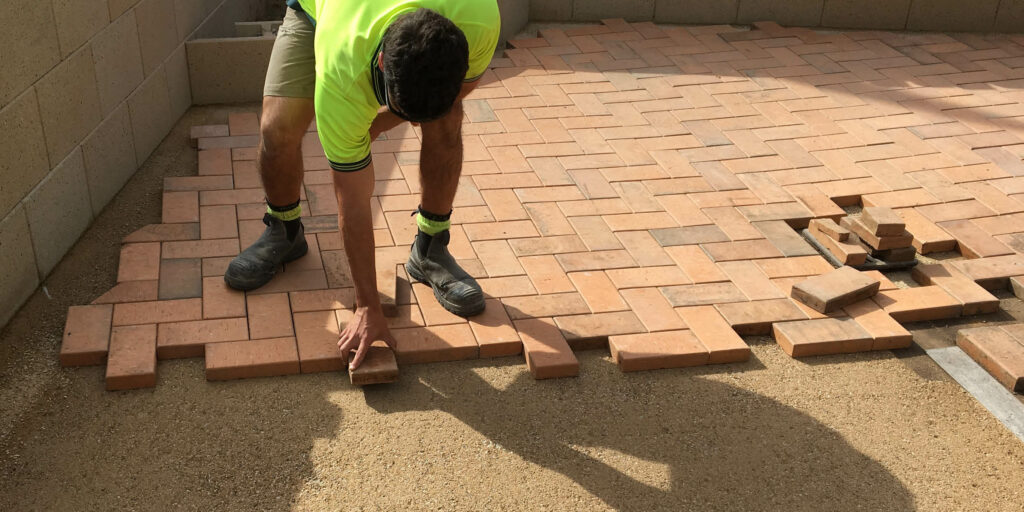
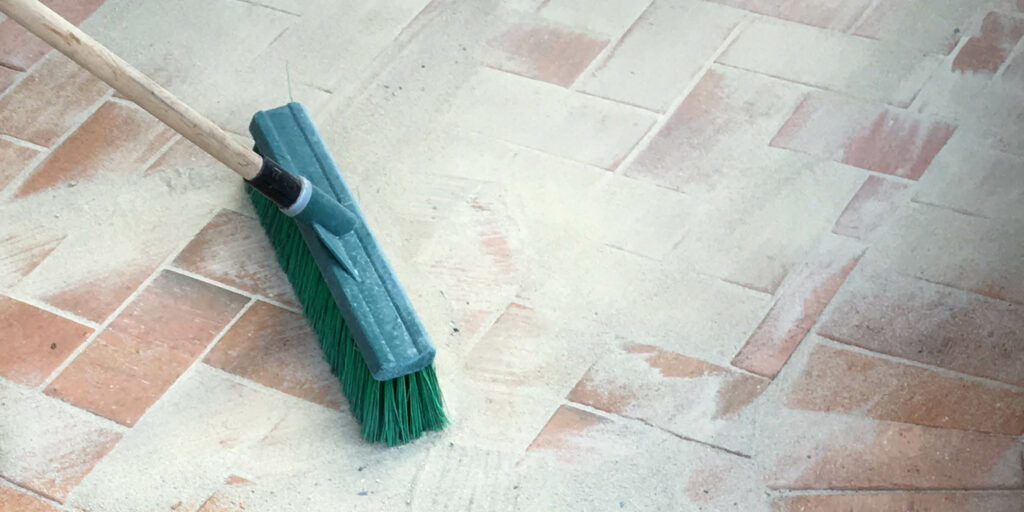
You can find all our products on our website, listing the products, features, and benefits to help you find what you need.
You can also visit your nearest APC store or phone them to talk through your paving project and choice of pavers. Our expert staff can help with your paving choice by working with you to find what benefits and features of your paving is required.
You can also download this blog as a brochure here –
Visit us at APC to pick up a free sample!
Or, send us a product enquiry or request a quote online









